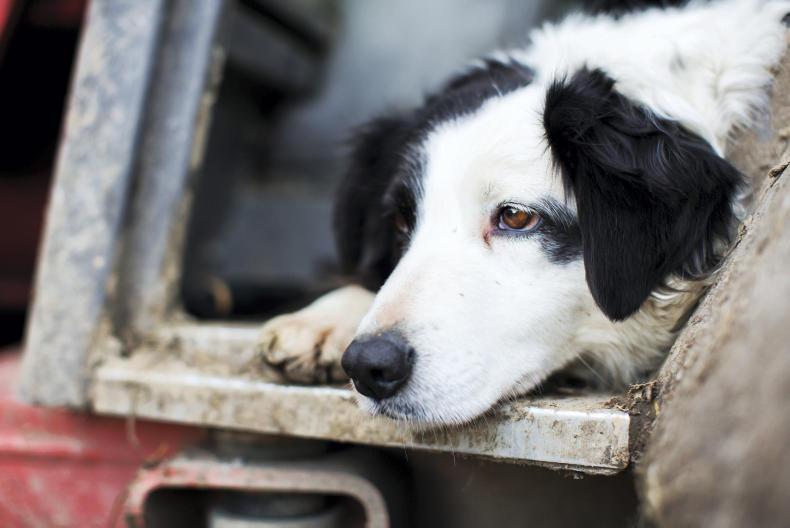
LOYALTY CODE:
The paper code cannot be redeemed when browsing in private/incognito mode. Please go to a normal browser window and enter the code there

LOYALTY CODE:
The paper code cannot be redeemed when browsing in private/incognito mode. Please go to a normal browser window and enter the code there
This content is copyright protected!
However, if you would like to share the information in this article, you may use the headline, summary and link below:
Title: Minding working and pet dogs
Risks can be greatly cut down by having an adequate health programme in place.
https://www.farmersjournal.ie/minding-working-and-pet-dogs-222691

ENTER YOUR LOYALTY CODE:
The reader loyalty code gives you full access to the site from when you enter it until the following Wednesday at 9pm. Find your unique code on the back page of Irish Country Living every week.

CODE ACCEPTED

You have full access to farmersjournal.ie on this browser until 9pm next Wednesday. Thank you for buying the paper and using the code.

CODE NOT VALID
Please try again or contact us.
For assistance, call 01 4199525
or email subs@farmersjournal.ie
Sign in

Incorrect details
Please try again or reset password
If would like to speak to a member of
our team, please call us on 01-4199525
Reset
password
Please enter your email address and we
will send you a link to reset your password

If would like to speak to a member of
our team, please call us on 01-4199525
Link sent to
your email
address
![]()
We have sent an email to your address.
Please click on the link in this email to reset
your password. If you can't find it in your inbox,
please check your spam folder. If you can't
find the email, please call us on 01-4199525.
![]()
Email address
not recognised
There is no subscription associated with this email
address. To read our subscriber-only content.
please subscribe or use the reader loyalty code.
If would like to speak to a member of
our team, please call us on 01-4199525
 This is a subscriber-only article
This is a subscriber-only article
Update Success !

When we think of animal health, discussions frequently centre on livestock, with dogs often down the list of importance. The health of dogs is important from a number of angles – the animal’s own health, risk of neospora in cattle and the lower risk of passing on certain diseases to humans. The best way to reduce the risk of any of these is to keep your dog healthy by administering an adequate health programme.
Sheepdog pups and young working dogs are most susceptible to health risks. Veterinary advice recommends vaccination against a number of life-threatening diseases (administered in one vaccine).
Two treatments are required, with the first administered at about eight weeks of age (in certain circumstances, it can be given as young as six weeks). A second injection is required two weeks after the first and completes the primary course. Full immunity is not developed until a week to 10 days after the full course. The advice is not to allow dogs to mix until immunity has developed. An annual booster is required to maintain protection. A vaccine is available for kennel cough, a highly contagious cough in dogs, which is particularly high-risk where dogs are mixing in public places or in trials.
Veterinary advice is to worm pups every two to three weeks until 12 weeks old and then every month until six months of age. The advice is every three months thereafter.
Take note that dogs should never be treated with anthelmintics approved for use in livestock for worms, lice etc as doing so can lead to adverse reactions and put the health of your dog at high risk.
Microchipping laws
Laws were implemented this year requiring dog owners to ensure that all dogs are microchipped and that the chip is correctly registered from 31 March 2016. There are a number of benefits to this from an animal health and safety perspective. Where adequately enforced, it will allow the owners of abandoned or roaming dogs to be identified and reduce the safety risks of dog attacks on sheep or in a minority of cases attacks against people.
All dog owners must have a certificate proving that each dog has been microchipped and registered as such. It is the responsibility of the owner to ensure that their contact details are maintained on one of the Government-approved databases.
The introduction of this law has meant it has been illegal since 1 September 2015 to buy or acquire ownership of a pup that has not been microchipped and correctly registered. Local authorities, authorised officers and An Garda Síochána will be responsible for enforcing the law. Vets will also be asking dog owners to ensure that their dogs are microchipped.
Offending owners who fail to comply with these regulations can face fines up to €5,000. The average cost of getting a dog microchipped at the vet is €25, though the cost of the procedure can range from €12 to €30 in the various animal health practices.
SHARING OPTIONS: